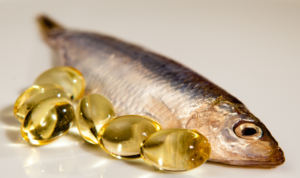Fish Oil for Dogs Explained: Should Max Go Fish?
Table of Contents
Many of us humans are well aware of the health benefits of using fish oils as a regular part of our diet – but did you know that you can give it to your dog too? As strange as this may sound, lot’s of pet owners around the world give their pets fish oil as part of their regular dietary routine for a variety of reasons. Just as we use vitamin and mineral supplements to ensure that we’re getting enough of everything we need for a healthy and balanced lifestyle, so the same applies to our dogs.
The benefits of giving your pet a regular and controlled dosage of fish oil is a more natural way of keeping them healthy whilst treating illnesses. The usual ‘go-to’ for both us and our pets when we’re feeling ill or have an infection, is to use antibiotics. While it’s true that this can be an effective means of treating the ailment, the reality is that using antibiotics weakens your body’s immune system and leaves you vulnerable to further infection – thus directly affecting the quality of your health.
The same applies to your pet. Because of this, more and more people are waking up to the reality of the natural option. It’s safer, cheaper and ultimately better than simply putting them on an antibiotics course. However, there are still some arguments surrounding the topic of using fish oil as a natural means of treating disease in your pet – but we’ll flesh those out a bit further in the article.
There’s no harm in investigating the health properties of fish oil for both you and your pet. Whether you choose to invest in natural remedies or opt for the more clinical, chemical-based treatments – knowing what you’re buying and the effects that they have on your pets health is important.
In my opinion, the natural option is always the better of the two, but you are free to treat your pet (and yourself) as you wish. Hopefully, once you’ve finished reading this article, your thoughts on the matter will be a little more clear. Knowledge is power and this enables you to find the best value for your money – something any sensible person will be looking for, especially because the cost of living keeps rising.
What is Fish Oil?

Fish oil is a blend of different oils from fish such as salmon, sardines, mackerel, black cod, herring, anchovies and tuna

Fish oil is a blend of different oils from fish such as salmon, sardines, mackerel, black cod, herring, anchovies and tuna
The first question on your mind is also the most sensible. I can only hope that you ask the same question for all of the conventional products you buy (for both you and your pet). Fish oil is essentially a blend of different oils from fish such as salmon, sardines, mackerel, black cod, herring, anchovies and tuna.
The process whereby fish oil is produced, whilst simple in principle, is a lot more complicated in practice than I originally expected. I’ll try and give you the brief summary. The fish are first caught and then sent off to a processing plant where they are cut into smaller pieces and steam-cooked.
The now cooked pieces of fish are pressed to help squeeze out and separate the liquids contained within (a mixture of oils and water). The mixture of oil and water are further processed to separate the oil from the water. Hot water is then reintroduced to the oil, to remove any impurities, and is evaporated shortly afterwards. The final step includes adding antioxidants to the oil to make it healthier and suitable for consumption.
Fish oil is rich in Omega-3 Fatty Acids which makes it an effective natural anti-inflammatory treatment. It can help keep your organs and joints free of inflammation and help to reduce the effects of dry, itchy skin. This makes it great for keeping your pet’s coat shiny and healthy and can even help to prevent or treat dandruff amongst other issues.
Is Fish Oil Safe For Dogs? What Dose of Fish Oil is Safe For Dogs?

The trick lies in finding the right balance for your pet

The trick lies in finding the right balance for your pet
Okay, so this is largely where the debate arises regarding the safety and effectiveness of fish oil for your pet. On one hand, many people agree that it is a safe means of keeping your dog healthy, maintaining a healthy coat and preventing inflammation both internally and externally.
On the other hand, a lot of people claim that giving your dog fish oil on a regular basis can in fact harm their health in more ways than one. Some claim that because most of the fish in the sea are already so polluted by all the toxic waste we dump into it, that when we consume their oils we ultimately ingest these harmful toxins which have such a negative impact on the quality of our health.
Others claim that consuming too much fish oil (and in turn, too much omega-3 fatty acid) can result in the formation of free-radicals forming in your pets bloodstream. Because, as they are broken down in your pets system, they form smaller, oxygen containing molecules that are essentially free-radicals. As some of you will already know, free-radicals are very dangerous molecules that can cause chain-reaction like damage in your system much like cancer cells. So avoiding free-radicals or any products that produce them is an important way to stay healthy.
So here lies our dilemma: should you give your pet fish oil as a way of keeping them healthy, or do you avoid it altogether and in turn, avoid any exposure to free-radical damage? In my opinion, the trick lies in finding the right balance for your pet.
Granted that your pet already eats a healthy and balanced diet and gets enough regular exercise, I would say that giving them a maximum of 3 fish oil tablets a week during or after a meal, should be fine. Any more than that and you run the risk of exposing your pet to free-radical molecules and ultimately causing your pet to suffer unnecessarily – even though your intentions are good. As with everything in life, balance is key. So finding that balance for both you and your pet, will enable the both of you to lead a healthy life. Once you’re balanced, natural products such as fish oil can only help.
Benefits of Fish Oil for Arthritis and Shedding Explained

You have to follow a steady routine to help curb the effects of your pets shedding

You have to follow a steady routine to help curb the effects of your pets shedding
Again, it’s important for me to stress that any and all possible health benefits of fish oil can only be capitalized on when it’s used in connection with a healthy, balanced diet, regular exercise and when used in the correct dosage. Too much could actually have the exact opposite effect in terms of worsening your dog’s arthritis and even increasing the rate and amount of hair that they shed. So it’s imperative that you buy good quality supplements to ensure that your pet is healthy before giving them the supplement.
As we know, fish oil is rich in omega-3 fatty acids. In turn, omega-3 fatty acids have a high amount of DPA and EPA as a part of their makeup. These are naturally occurring acids that help to thin the blood and thus prevent clotting. This means that they can help to reduce blood pressure, lower the risk of a heart attack (rare in dogs, but still a possibility regardless of breed) and also help to ease swollen joints – the main cause of arthritis.
With regards to shedding, it’s important to note that a single product (whether it’s natural or synthetic) will not be able to stop shedding altogether. You have to follow a steady routine to help curb the effects of your pets shedding and utilizing fish oil in this process can help.
Firstly, it’s important to brush your pet’s coat regularly with an appropriate brush. This will help to reduce the amount of excess hair on your pet’s coat (less to shed) and can help to keep their coat clean and tidy. Then, always be sure to bathe your dog routinely. Some people prefer to do so once a week, others twice a month. It really depends on the breed, how often you walk them and how dirty they get. Either way, keep those baths coming.
Only then, giving your pet fish oil (a maximum of 3 times a week) can help to improve the condition of your pet’s skin. By keeping it hydrated and nourished from within and stimulating the flow of blood, it allows the necessary vitamins and minerals to reach your pet’s skin more easily. This also helps to give your pet a shiny coat as the oil is secreted through the pores of the skin and lines the hair follicles, keeping them hydrated and healthy. The same applies to your own hair too – so be sure to give fish oil a try as well if you feel the need to restore your hair’s natural sheen.
Fish Oil Before and After Results

Try the oil in small amounts at first, and slowly increase it to the recommended dosage

Try the oil in small amounts at first, and slowly increase it to the recommended dosage
I was quite nervous about using fish oil on my dog (I have a German Shepherd). After doing the research online, I found all the mixed opinions that are so common with anything on the internet these days. So before jumping onto the holistic bandwagon, I decided to try the oil in small amounts at first, and slowly increase it to the recommended dosage (3 max per week) as a means of monitoring my dogs reaction to the stuff. I started with just 1 a week for 3 weeks and saw nothing bad happen. Then 2 a week and now finally 3 times a week without any problems. It’s important to note that it takes a while for the effects to show up and that you have to stick to a consistent dosage for at least 3 months for anything worth noticing to happen.
However, by now I’ve noticed that my dog’s coat has become a lot thicker than it once was and it shines like when he was a puppy! There’s also a lot less hair around the house and on the furniture – which is great because it’s my only ‘pet peeve’ about owning a pet. I’ve also switched to a natural shampoo and no longer towel dry my dog after bathing. I prefer using the blow-dryer on a low heat as it gets rid of excess, loose hairs and helps to give his coat that beautiful shiny lustre we all missed so much.
Fish Oil For Dogs: The Benefits and the Difference Between Different Oils https://t.co/TucLQ4fbb4 pic.twitter.com/mgRtTFe1IO
— Pet Connect (@Lost_Fido) June 21, 2017
Conclusion
To conclude, I would recommend doing as much research on the subject as you can before giving your pet any organic supplements or synthetic treatments/medications. This is important, as giving your pet the wrong supplement or in the wrong dosage can have the opposite effect on your pet’s health and wind up costing you more than just another trip to the vet.
So long as you stick to the recommended dosage and make sure that you’re giving your pet a supplement (in this case fish oil) that is suitable for them to take, you shouldn’t have any problems. However, being wary of your pet’s health in the early stages of administering the supplement is important for gauging their reaction to it.
Should you notice anything abnormal (increased shedding, vomiting, limping etc.), immediately stop giving your pet the fish oil and seek the advice of a professional veterinarian. Otherwise, I’d highly recommend fish oil as a great way to maintain and regulate your dog’s health in a natural way. It’s worked for me, so it should work for you too. Either way, it’s well worth a try as it’s affordable and effective.
At Edumuch, we bring all of the best articles and reviews of topics ranging from DIY MacBook Skins and Short Hair Curling to Top-10 KSG Accessories and a 2016 Razer Abyssus Review
No comments yet.